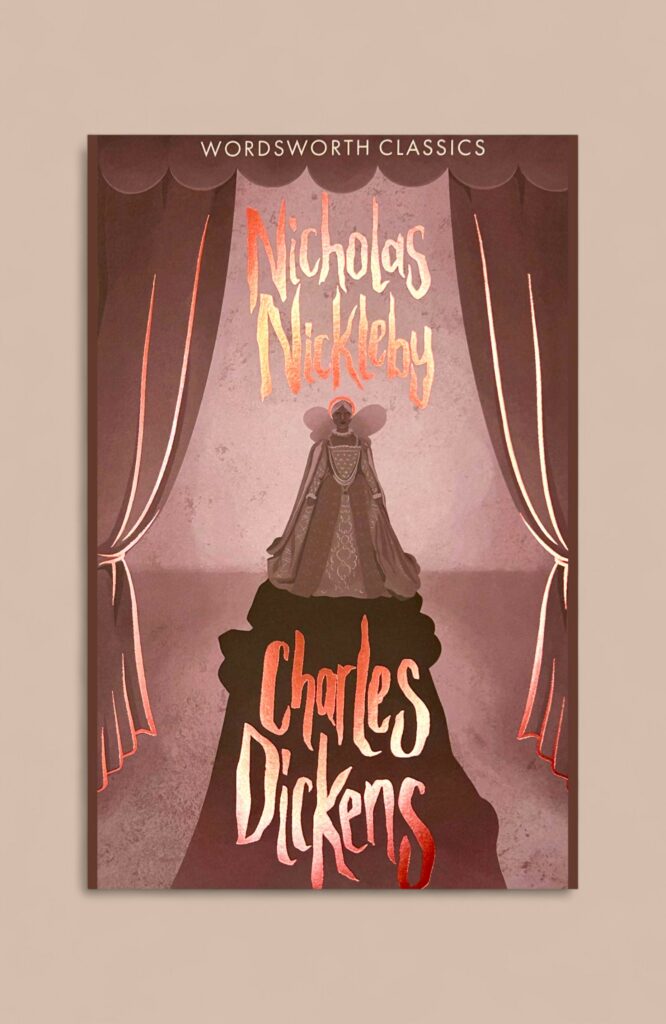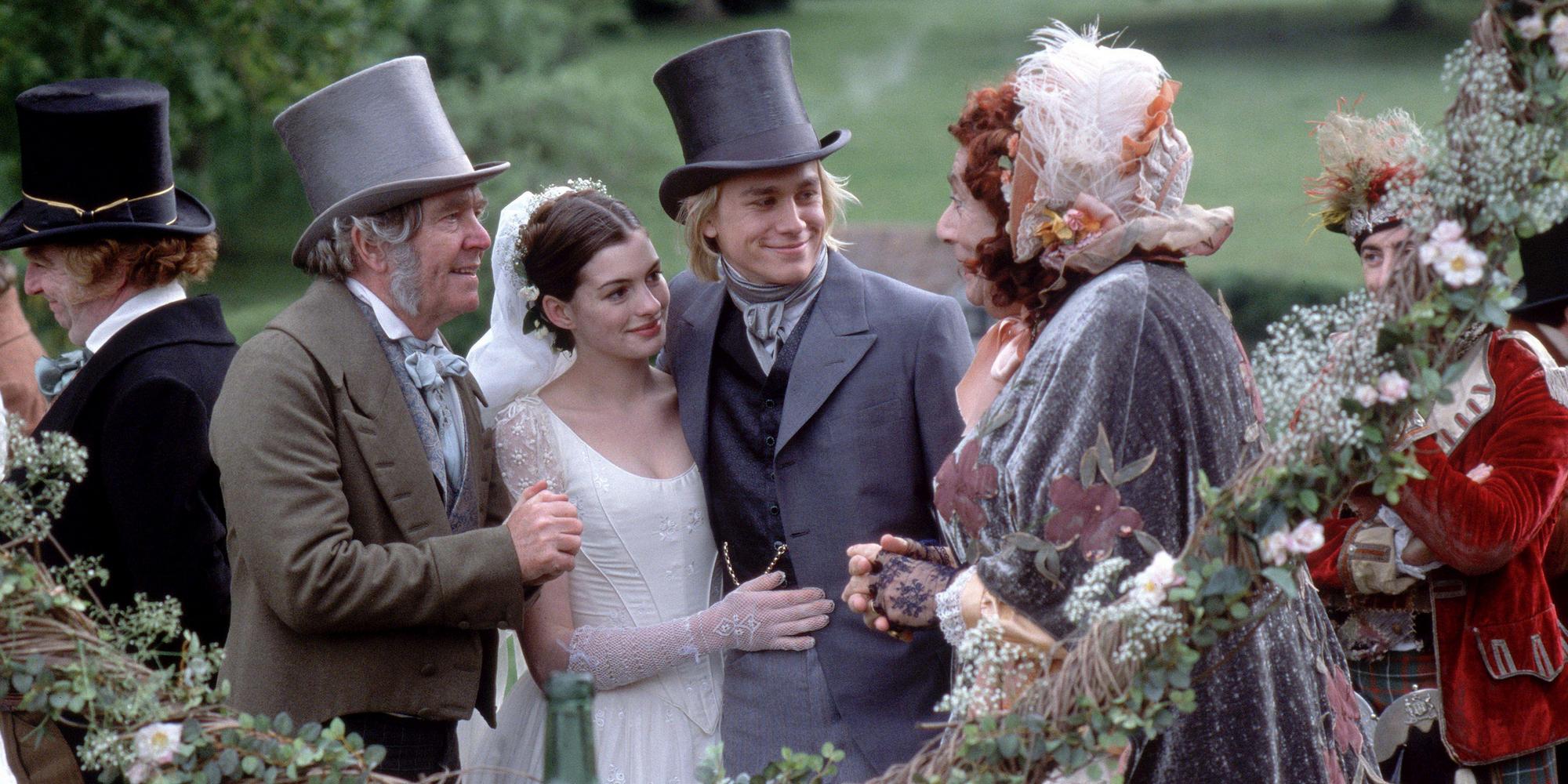
Classic of the Week: Nicholas Nickleby
David Ellis looks at Charles Dickens’ third novel. Classic of the Week: Nicholas Nickleby
If there were a prize for the most unpleasant character in Nicholas Nickleby it would be hotly contested. Prominent among the contestants would of course be Wackford Squeers, the ignorant barbarian who runs a school in Yorkshire for boys whose parents want to see the back of them, largely because they are illegitimate. There is early illustration of how the sins of the fathers can be visited on their offspring when Squeers viciously beats one of his young charges because his father has been late paying the school fees. He is a sadistic bully but his wife is hardly better. When he is in London, drumming up custom for his school, Squeers likes to claim that she is like a mother to all the boys but that is only true if motherhood consists in underfeeding your children until they fall ill and then berating them for being sick. lassic of the Week: Nicholas Nickleby
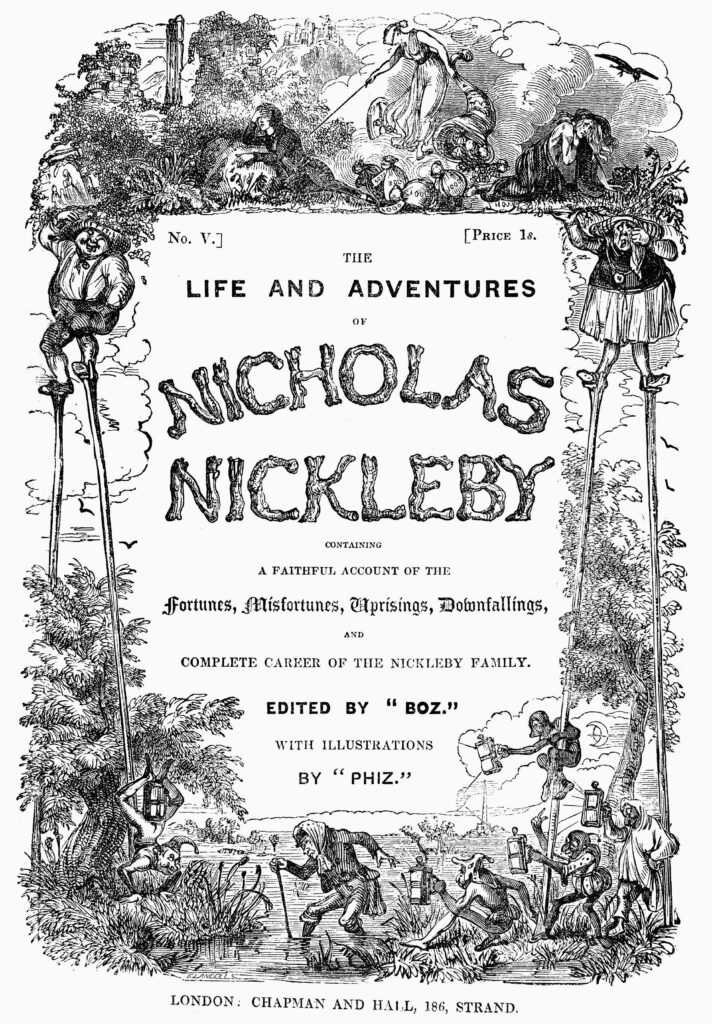
Cover of Volume 5 in the serial publication, 1838.
There is some excuse for the Squeers daughter, Fanny, in that her best friend is both cleverer and prettier than she is and has already secured as her fiancé, a local farmer whose broad Yorkshire dialect Dickens renders triumphantly. Fanny hopes to go one better than her friend by setting her cap at the young man whose name provides the title for this novel and whose family’s financial troubles have forced him to take a job as Squeers’s teaching assistant. But Nicholas’s rejection of her advances brings out the worst in her and the letter she writes to his uncle Ralph in which she itemises his supposed misdoings, and part of which Tim Cook quotes in his excellent introduction to the Wordsworth edition of this novel, is a fine example of concentrated malice, even if its spelling and grammar are hardly what one might expect from a schoolmaster’s daughter.
Provincial candidates for this prize are outnumbered by those in London. Miss Knag, the supervisor of a group of seamstresses at a fashion house owned by a Madame Mantalini, takes against Nicholas’s sister Kate, after she has had to accept a job there, only because she is better looking and above all younger than herself. The recent scandal at Harrods has suggested that the vulnerability of shopgirls persisted long after Dickens’s time and a shopgirl is essentially what Kate becomes (she is never shown doing much sewing). A prey to sexual predators, she is like the young girl tied to the rails in the old silent films who is threatened by the oncoming train and has first of all to deal with the attentions of Madame Mantalini’s husband, a splendid portrait of a decayed Regency rake. A far more formidable threat then appears after her uncle Ralph has offered her as bait to Lord Verisopht, in the expectation that his lordship will borrow even more money from him, and Verisopht’s manipulating friend and parasite, Sir Mulberry Hawk, comes close to raping her. lassic of the Week: Nicholas Nickleby
Cold and heartless, Ralph Nickleby’s only interest is in making money and he is therefore a leading contender for being the chief villain of this novel and yet, if one were to make the criterion the degree of frustration and anger the reader experiences in following the fortunes of all these characters, my own choice for the prize would not be him but Mrs Nickleby, his dead brother’s widow and the mother of Nicholas and Kate. At first sight, and in comparison with characters like Ralph, Hawk and Squeers, Mrs Nickleby might appear quite blameless. Yet whereas they are more or less aware of a moral code they are prepared to infringe she has an egotism so powerful that she can construct around herself a world in which she has always acted for the best, simply denying or failing to recognise either truth or reality (an ability we saw in action recently in the United States during the presidential election). Although Dickens makes it clear it was she who nagged her late husband into making the investments that led to the family’s financial downfall, Mrs Nickleby periodically blames him for her troubles.
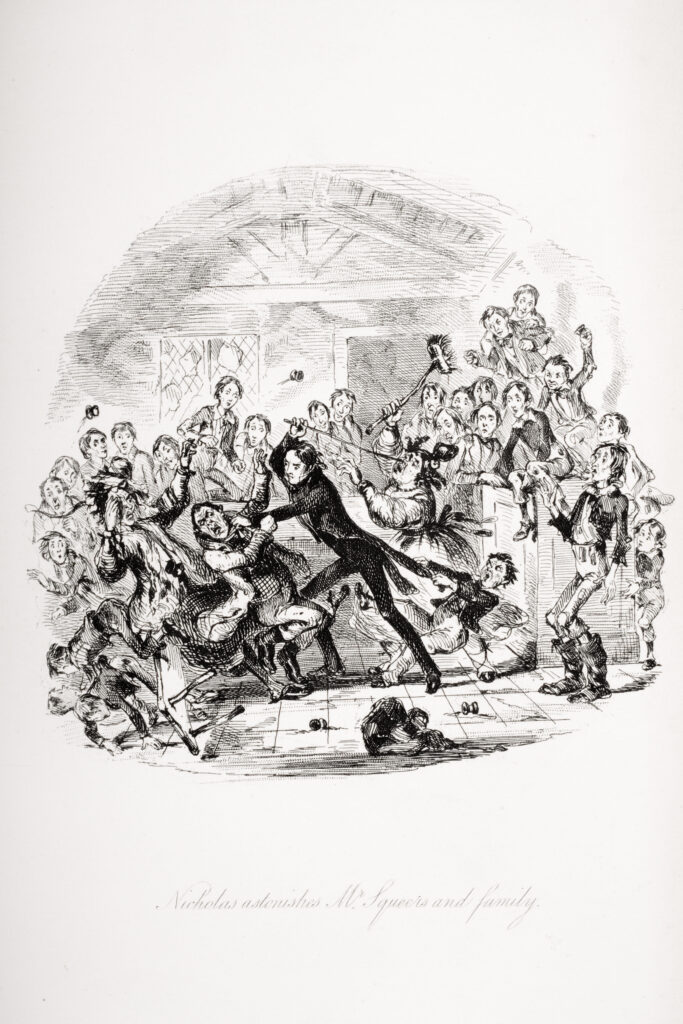
Nicholas astonishes Mr Squeers and family. Illustration by Phiz.
When Nicholas is forced to take a job with Squeers, she quietens any anxiety a normally observant mother might feel by imagining that he is on his way to prosperity and she is positively delighted with the attention paid to Kate by Verisopht and Hawk because she has convinced herself that her daughter will soon be making an advantageous marriage. Every misfortune that occurs she either denies or adapts in order to ensure an entirely complacent and self-satisfied peace of mind. The way that mind operates is briefly summarised by Dickens when he is describing how she reacts when she hears of the fate of Smike, the youth Nicholas has rescued from the clutches of the Squeers family and who, mainly because he has been so ill-treated, subsequently dies. `She gave vent to her sorrows’, he writes, `after her own peculiar fashion of considering herself foremost’. In spite of this explicit reference to his character’s self-insulating selfishness, Dickens protects her from the comeuppance reserved for Squeers, who is transported, or Hawk who ends his life miserably in debtors’ prison, and also for Ralph who at least has the decency to hang himself once all his plots are uncovered. Mrs Nickleby meanwhile sails complacently on, profiting from her children’s eventual good fortune and no doubt congratulating herself on her sagacity in having foreseen it.
Ah, but, someone might ask in hearing about all these people, isn’t Dickens supposed to be a comic novelist? So he is and some of the funniest episodes in Nicholas Nickleby occur when its hero has left Squeers’s school and falls in with a touring theatre company led by the inimitable Vincent Crummles. Its star attraction is `the infant phenomenon’, Crummles’s own daughter, who has been the same age for the last five years and encouraged not to grow any taller by late nights and an `unlimited allowance of gin and water’. Its other members are described with a warmth and humour that reveal how fascinated Dickens always was by the theatre and he shows a justified confidence in his own writing by making affectionate fun of the melodramas they perform so incompetently while he himself is practising that same art at the highest level. Every time the narrative reverts to Crummles, it is a comic delight but the treatment of its more serious matters is not without comic aspects also. Ralph Nickleby is never funny but attached to Mulberry Hawk, parasitic on him just as he is parasitic on Verisopht, are two abettors in his plots to `ruin’ Kate called Push and Pyke. They are in a tradition of semi-comic duos which goes back at least as far as the two men who come to murder Clarence in Shakespeare’s Richard III. The comedy involving Squeers is more obvious: the more often he appears, the more familiar the reader becomes with the outrageousness of his claims for his own pedagogic methods while the way he encourages his young son to overeat, so that his obesity will give an entirely false impression of the fare he offers his pupils, is a successful running joke. The amusement Squeers provides is in tune with the illustrations, with their element of caricature, which Hablot Browne provided for each of the novel’s monthly instalments when they first appeared, although why we should find caricature funny is a deep question. Classic of the Week: Nicholas Nickleby
Comedy is associated with Mrs Nickleby also. Dickens conceives her as someone incapable of making a contribution to any conversation without invoking her own, usually irrelevant personal experience. This makes her a bore along the lines of Miss Bates in Jane Austen’s Emma, but a Miss Bates on steroids, both authors easily handling the challenge of how to represent what is boring without being boring themselves. Another character in Emma, the heroine’s hypochondriacal father, has been described in the past as
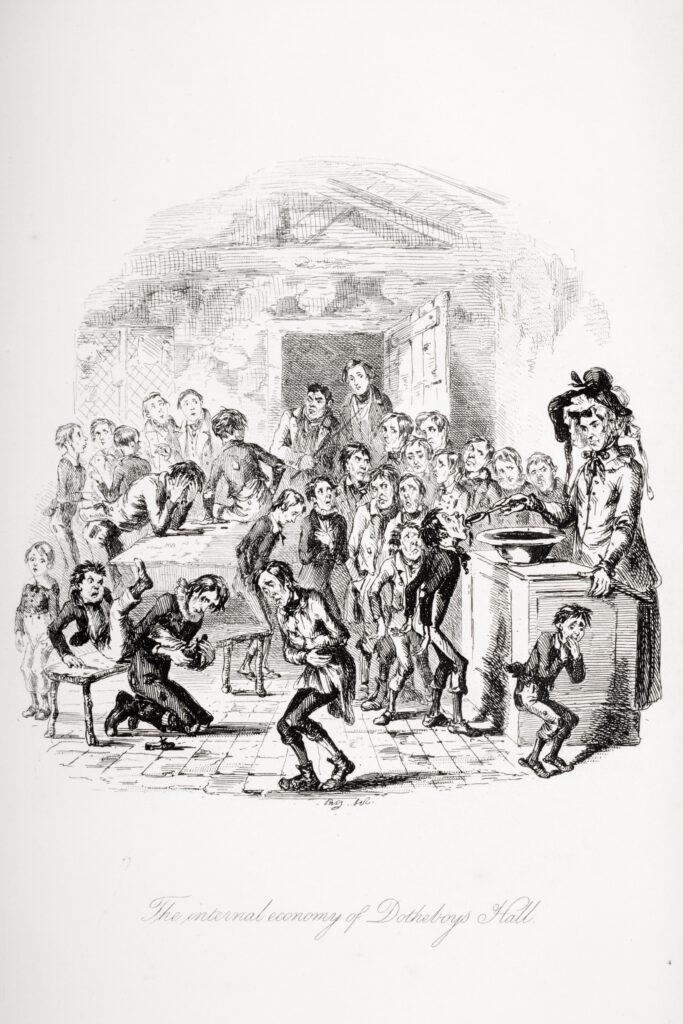
The internal economy of Dotheboys Hall. Illustration by Phiz.
the strongest argument for euthanasia in literature, but that was without reckoning with Mrs Nickleby. The comic climax associated with her comes when she is settled with her two children in a cottage in the country and a few friends are invited to tea. Next door to the cottage lives a man who has previously demonstrated his lunacy by throwing large vegetables over the garden wall to attract attention and then appeared at the top of it to express his passionate love for Mrs Nickleby in terms so extravagant and surreal that they are tribute to the remarkable fertility of Dickens’ imagination. Young Kate immediately recognizes that he is not sane but her mother, who is vain as well as stupid, refuses to acknowledge that there is anything untoward about the adoration he expresses. During the tea party, this neighbour contrives to escape from his keepers and gets stuck in the chimney as he is attempting to enter the Nicklebys’ house. Eventually pulled down, and still in his `small clothes’, he notices that there is another lady present and addresses to her the same extravagant declaration of love he had previously reserved for Mrs Nickleby. When she points out that he is making a mistake and she is the one to whom he ought to be speaking, he calls her a cat and advances upon her in a `species of savage dance’. Here at last, the reader might think, is an episode that will oblige Mrs Nickleby to admit she is dealing with a madman and face up to the world as it really is. Yet when she comes to reflect on the situation, she decides that what had caused the neighbour to lose his mind temporarily was that his previous addresses to her had received too little encouragement and it was therefore the pangs of rejected love that had caused him to act in the strange way he did. There is therefore no reason for her to adjust her view of a world in which she is conscious of always playing a principal and blameless part.
Nicholas Nickleby is a long novel with many more successfully described incidents and characters than I mention here and it cannot therefore, and indeed should not be rushed through. A few weeks ago some of us woke to hear Jonathan Bate, formerly and possibly still a professor of English at Oxford, deploring the fact that young people no longer read long novels and the general decline of literary culture. This was hardly any more like news than the latest reports on stasis in the war in Ukraine, given that anxiety on these cultural matters has been abroad for the last hundred years. Bate recalled that when he was a student, he could manage three novels by Dickens in a week, a claim that led a correspondent in The Times into calculations about how many hours a day in front of one of them that would mean. But the point was not so much the physical demand that reading three Dickens novels in such a short period would impose but the insult it would imply to one of the greatest literary talent this country, or any other, has ever seen. It may of course be quite true that fewer long novels are now read than in Bate’s younger days and that a shortened attention span induced by social media has something to do with this; but the problem of the undoubted decline of literary culture in general is not that it should be recognised but to know what, if anything, can be done about it. Only perhaps in North Korea could televisions sets be removed from homes, mobile phones abolished, and all parents obliged to take night-school lessons in reading aloud to their children. What we need are not wails of complaint about the inevitable but measures that might mitigate the situation. In that context, it would be useful to take a number of literary classics, republish them in attractive, easy to read formats, furnish them with intelligent introductions and then sell them at ridiculously low prices. Now why didn’t somebody ever think of that?
Main image: Scene from the 2002 film. Credit: HART-SHARP ENTERTAINMENT/UNITED ARTISTS/POTBOILER PRODUCTION / MEIN, SIMON / Album / Alamy Stock Photo
Image 1,2 and 3 above: Illustrations by Hablot Knight Browne, known as Phiz. Credits: 1: GRANGER – Historical Picture Archive / Alamy Stock Photo; 2 & 3 Classic Image / Alamy Stock Photo;
More for information on Dickens’ Life and Works, visit: The Dickens Fellowship
Our edition of Nicholas Nickleby is here: Nicholas Nickleby – Wordsworth Editions
Classic of the Week: Nicholas Nickleby
Classic of the Week: Nicholas Nickleby
Classic of the Week: Nicholas Nickleby
Classic of the Week: Nicholas Nickleby
Classic of the Week: Nicholas Nickleby
Books associated with this article
